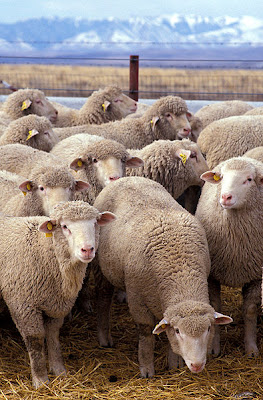Commons here refers to a collective resource, which in its original context referred to a pasture for sheep.
Blaring it all out
The tragedy of the commons was first described by Hardin. Hardin observed a patch of green pasture surrounded by very barren land in North Africa. He investigated and found that the green pasture was privately owned land, while the surrounding barren nightmare was commonly held land, or commons.

A flock of sheep. Their behaviour is characterised by the donning of ceremonial Che Guevara t-shirts, a fondness for the band System of a Down and selective mind filters which only allow the writings of Karl Marx, Noam Chomsky, Jacques Derrida or Slavoj Žižek to leave its sediment inside their hive mind. My name is bleating heart liberal and I approve of this message.
The owner of the green patch in the centre had immediate incentive to protect his own land from devastation for his sheep. The surrounding barren land was commonly held, where individual sheep owners could let as many sheep loose as they could, without having an immediate incentive to take care of the commons. This means that they achieved a greater incentive from squeezing as many sheep as possible on the common lot (no Australian or New Zealander jokes, please). From their perspective, despite the No Free Lunch theorems, their sheep managed to get a free lunch.
The tragedy of the commons is a controversial topic, but it is valuable because it raises questions about environmental economics and how we are to deal with global warming.
Greed is good. Or is it?
As we've seen with the prisoner's dilemma, greed is good for you, in that particular context. This is because the incentive was greater while being selfish than what it was for being considerate and hopeful. When it comes to a commonly shared resource, like the commons, or the commonly owned coffee at the work canteen or water from the water cooler, being selfish and greedy is good for you in the immediate future but not so good in the long run.
Since the devastation of adding one more sheep does not immediately show, it is easy for individuals to always add one more sheep on a commons. Taking care of the resource is not explicitly your own problem so it implicitly becomes someone else's problem.
It is convenient to ignore the cumulative, long term effects of seemingly insignificant events, but once they accumulate and take their toll, the result is a depleted resource and massive sheep starvation. Or programmers without coffee. Trust me, code monkeys without coffee are far more devastating than sheep that can't graze.
Taxation: A tragedy of the commons scenario?
This makes me wonder about taxation. Taxation is similar to the commons that is supposedly to the benefit of everyone, but since nobody feels the cumulative effects of small tax increases immediately, it is always easy to hire one more minister, have one more department, or bail out one more bankrupt institute like General Motors or the SABC (as if going without television in South Africa would be a great loss to primate kind).
Small, private gains like flying your family around at the government's expense are easily dismissed as being negligible. Especially when compared with the intuitively worse effects of executive bonuses, even though they are few and far between and in reality have far less impact than a meagre wage increase for a few thousand workers, or a few hundred fat cats zipping around in private jets paid for by tax money.
It's easy to justify raising the taxes on the rich just a little to compensate for the Greater Good, while lowering the burden on the poor. Meanwhile, since some abstract like public interest takes care of the resource, each middle man in the loop can easily pass the hot potato of responsibility to the next middle man. Ensuring that public funds are handled responsibly becomes someone else's problem.
But small, seemingly negligible increases in taxation add up, as do small, seemingly negligible acts of corruption and incompetence. Once the straw has broken the camel's back, the sheep will be without a place to graze.
For a related topic, see Roznik's Utility Monster, which I should have included in my list of demons.


No comments:
Post a Comment